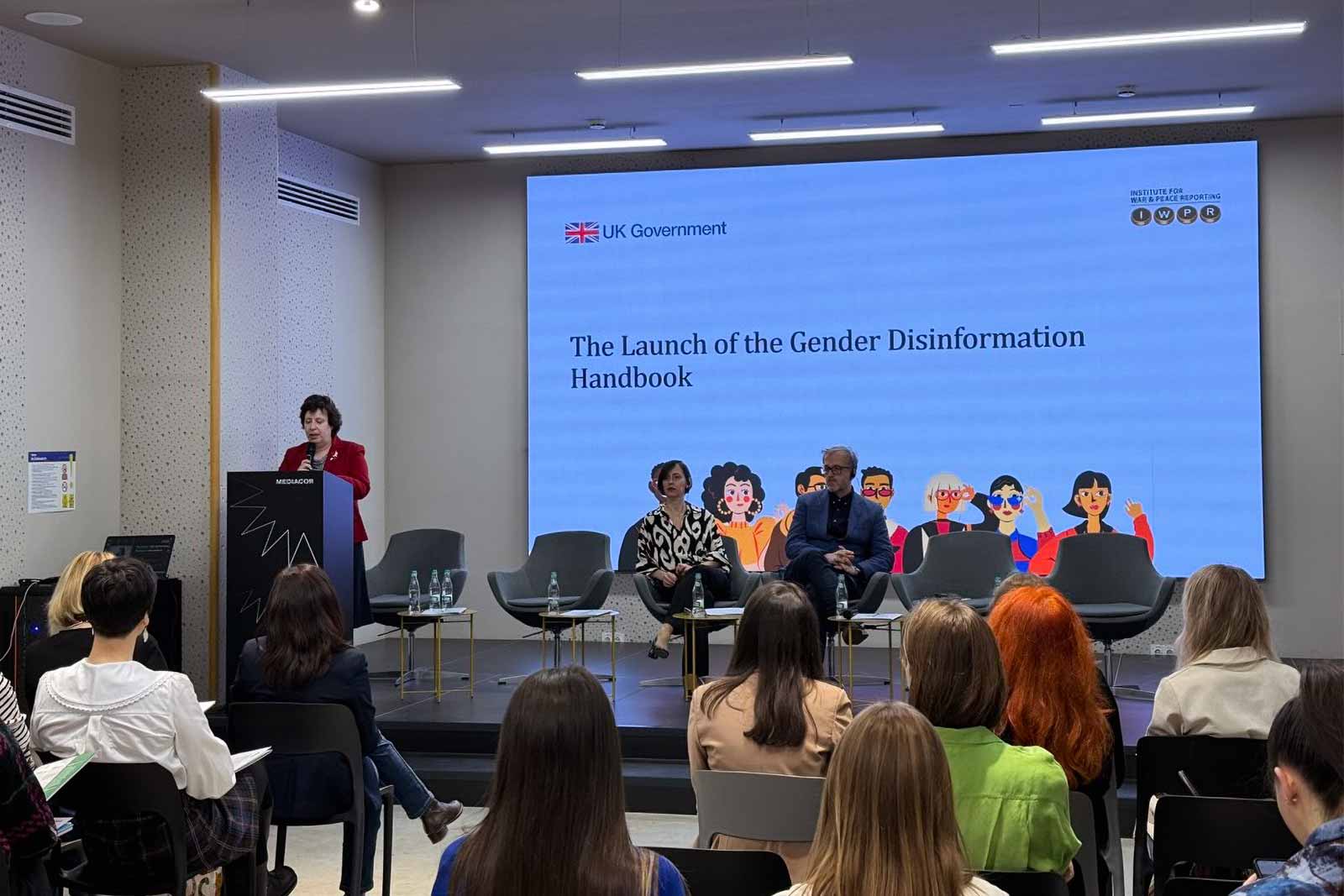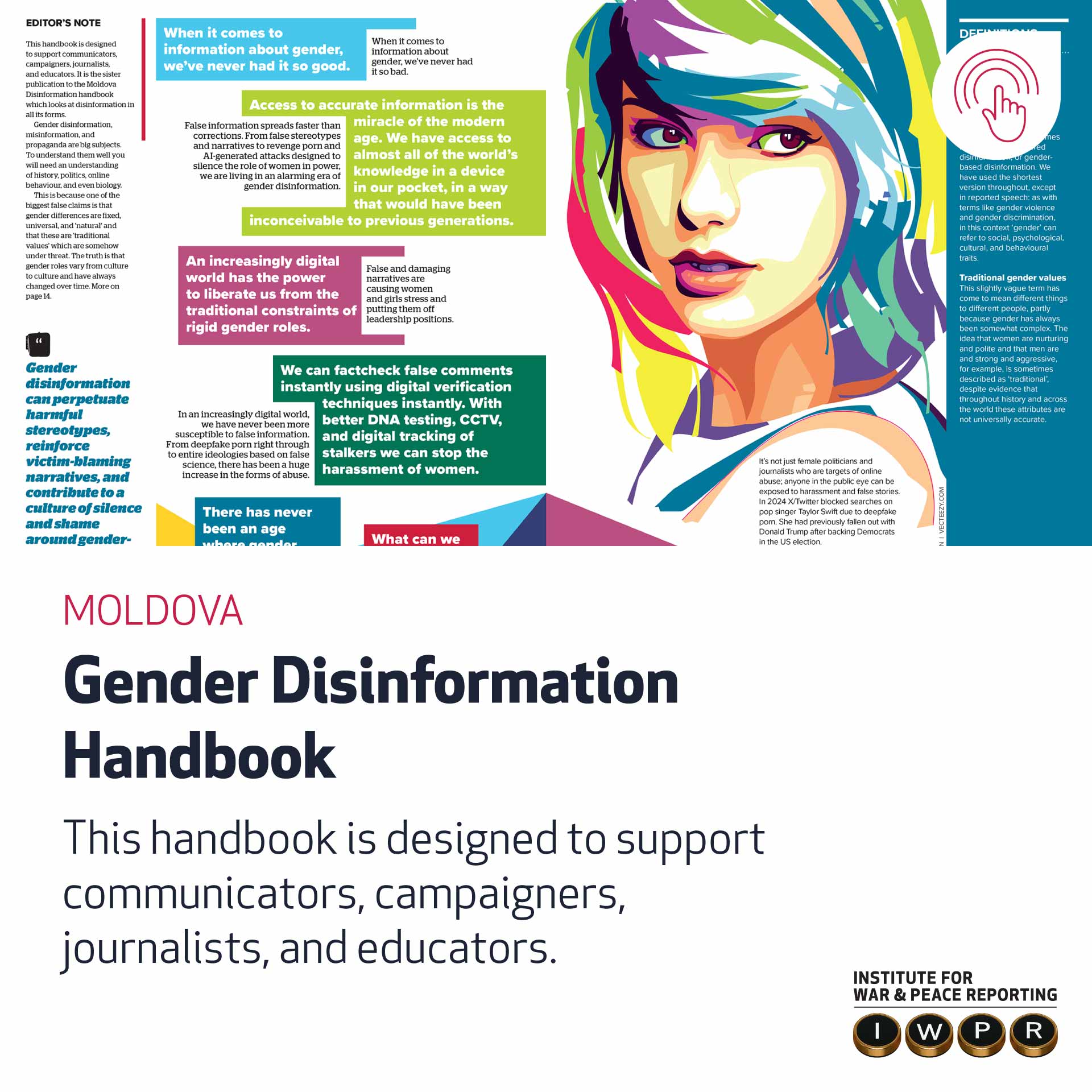Taylor Swift, Vladimir Putin and Kids Identifying as Cats
IWPR guide explores how malign actors use gendered narratives to disrupt societies – and lays out techniques to counter them.
In a year that will see an unprecedented number of people vote in elections around the world, a new IWPR handbook, Moldova: The Gender Disinformation Handbook, looks at how gender disinformation affects the democratic process.
The handbook was produced in the framework of IWPR’s work in Moldova: the country is seen as particularly vulnerable to Kremlin-sponsored disinformation as a small state bordering Ukraine and with significant Russian speaking populations.
In March the guide was launched in the capital Chisinau with the panel discussion “From Taylor Swift to Vladimir Putin: how gender disinformation has taken hold and what we can do about it?”. The event gathered diplomats, government officials, activists, journalists and students to discuss the sharp increase in false and malicious narratives that deliberately target individuals on their gender and other identities, with the specific aim of dividing and polarising communities.
“Gender narratives attack the role of women and minority groups in society, using identity politics and satire to undermine them,” Fern Horine, British ambassador to Moldova, said in her keynote address. “Online harassment and threats, including content attacking their personal lives, and in some instances, instigating physical threats or attacks on individuals… discourage [women] from participating in public discourse and debates on the future direction of their country, when the exact opposite should be happening. We should be encouraging the voices of women and others in democratic debate.”
The reference to pop stars and global political figures was on point.

“Gender disinformation is a major challenge and it is a global phenomenon, encompassing popular culture and geopolitics,” said Monica Ellena, IWPR’s Eurasia Editor who co-authored the handbook with British writer and broadcaster Nick Raistrick. “Swift and Putin have been respectively a target and an instigator of such polarisation, with smear campaigns targeting women in public life, journalists, activists, politicians. And global music stars.”
A sister publication to IWPR’s disinformation handbook, the guide explores how gender identities are being used to create stories designed to infuriate and stoke hatred, as well as laying out techniques to counter them.
Nick Raistrick stressed that gender disinformation, misinformation, and propaganda are big subjects, which to be fully understood require knowledge of history, politics, online behaviour, and even biology.
“This is because one of the biggest false claims is that gender differences are fixed, universal, and ‘natural’ and that these are ‘traditional values’ which are somehow under threat. The truth is that gender roles vary from culture to culture and have always changed over time,” he stated.
Some of the topics illustrate how apparently trivial stories can be used by malign actors to sway public opinion and fight wider culture wars. This in turn impacts national security and challenges good governance.
For instance, the handbook highlights an entirely false report about school children identifying as cats that was amplified to make Western liberals look gullible and to ridicule gender movements. This feeds into the Kremlin narrative that contrasts Europe - where the Kremlin claims that gay propaganda and gender ideology are forced on children - with traditional, Orthodox Russian values.
Other aspects of gender disinformation use astroturfing techniques – fake grassroots campaigns – to whip up outrage about fringe or divisive topics. Then there are new and emerging technologies: this year, X (formerly known as Twitter) blocked searches on pop singer Taylor Swift due to deepfake porn. Female politicians and journalists are also targets of online abuse, harassment and false stories.
During the discussion in Chisinau Anatolii Oprea of UN Women Moldova underlined the critical role men and boys play in tearing down barriers. “They can fight privileges and toxic masculinity, as well as violent ways these norms manifest themselves in the society. They have the power to change the narrative,” he said.
At the core of this process lies education, said Ana Revenco. The director of the Centre for Strategic Communication and Combating Disinformation stated that education is key to lay the foundations for an equal and inclusive society and to build critical thinking, which is an essential tool to counter disinformation in all its forms.
Nina Sutac, General Secretary of the Platform of Gender Equality, echoed this focus on inclusivity and solidarity. Gender disinformation is intersectional, meaning that combined identities can affect marginalised people and groups. Research shows that women from racial, religious, or other minority groups, including people with disabilities, are targeted more often than white individuals.
“They are crucial to the conversation; we need to have them at the table,” she said.
Media literacy is an integral element of this educational cycle, added Ana Gherciu, development director of Moldova.org, a media platform which has embraced solution journalism to address some of the country’s more pressing issues.
Countering Disinformation Moldova: Collaboration and Defence (CDMCD) is supported by the Foreign, Commonwealth & Development Office (FCDO), aimed at strengthening the capacity, collaboration, and effectiveness of local Moldovan organisations to build resilience of the Moldovan public to disinformation and interference from hostile actors. The project is led by IWPR and implemented with 11 CSOs working at a local and national level across the country.
This publication was prepared under the “Countering Disinformation in Moldova” project.

